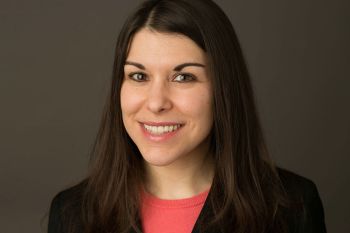
The George Washington University (GW) Cancer Center is pleased to announce that Katherine Chiappinelli, PhD, was awarded a prestigious grant from The G. Harold and Leila Y. Mathers Foundation. The research project titled, “Epigenetic Modification and Expression of Retroelements in Cancer Development” is funded by a two-year, $300,000 grant. This award includes a subcontract with Kathleen Helen Burns, MD, PhD, professor of pathology at Johns Hopkins Medicine, an expert in the field of repetitive elements in cancer.
“I am honored to have received this wonderful funding for this important work,” said Chiappinelli, who is an assistant professor of microbiology, immunology, and tropical medicine at the GW School of Medicine and Health Sciences. “I hope this research will bring us one step closer to understanding cancer – a disease that affects so many people.”
Less than three percent of the DNA in our genome encodes proteins. Recent work has shown that a significant part of the genome, initially considered “junk DNA,” does not code for proteins but has important biological functions, especially in cancer initiation and progression. The project will define epigenetic determinants of repetitive element (“junk DNA”) control during tumor progression and lay the groundwork for understanding interactions between these elements and the host immune system. Repetitive elements are very different in cancers compared to normal cells, but we do not yet know which elements are affected and how they are altered as cancer progresses. Outcomes will include a more complete understanding of cancer progression and the identification of novel cancer therapeutic targets and/or biomarkers.
Chiappinelli’s working hypothesis is that expression of distinct endogenous retrovirus loci – remnants of infections of former exogenous retroviruses now in the host genome - can promote double-stranded RNA virus formation and interferon signaling, changing the immune microenvironment of cancers. Chiappinelli and her team predict that repetitive elements in the genome will interact with the innate and adaptive immune response to promote an “immune evasive” tumor state. Chiappinelli and her colleagues will work to produce a comprehensive map of repetitive element regulation and expression during progression of common tumors including lung and ovarian cancer.
The G. Harold and Leila Y. Mathers Charitable Foundation’s mission is to advance knowledge in the life sciences by sponsoring scientific research and applying learnings and discoveries to benefit mankind. Basic scientific research, some with potential translational application, is central to this goal and fundamental to their operating principles.


